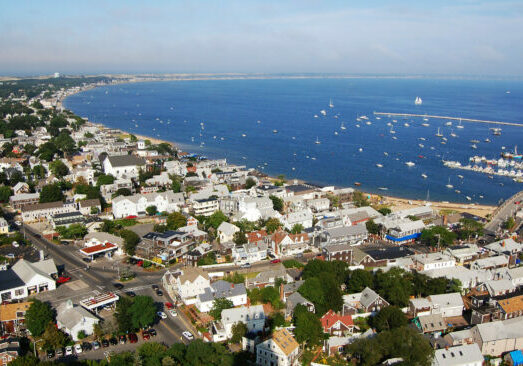May 29, 2014
In Anticipation of an Offshore Wind Energy Pipeline, Employment Growth In New Bedford
By Val Stori
A little over a year ago, the Massachusetts Clean Energy Center (MassCEC) began construction of the New Bedford Marine Commerce Terminal, a multi-purpose facility designed to support offshore wind deployment on the Atlantic coast. The Terminal is ideally situated in close proximity to the major offshore wind projects currently under various stages of development and consideration and it has been engineered to handle the heavy and oversized loads associated with an offshore wind industry. In December and January, MassCEC came close to meeting its employment goal of 170-200 jobs for the project; the terminal employed 120 people, nearly 20 of whom were from New Bedford. (Monthly employment statistics are available in these monthly presentations.)
MassCEC, a state agency leading the development of the clean energy sector, is interested in using the Terminal to support the commercial deployment of offshore wind along the Atlantic coast. But the charge of the agency is not solely to advance clean energy—other agency priorities include job creation, workforce development, and infrastructure investment. The New Bedford terminal presented an opportunity to invest in both clean energy and workforce development in a city with the State’s highest unemployment rate. The Port already served as an anchor for economic opportunity–over 4,400 people are employed at the port, and the city itself is home to more than 200 maritime-based businesses. The MassCEC investment in the port supports not only infrastructure and construction, but also the creation of up to 200 jobs and workforce training. Various agreements lay out the terms for hiring, workforce development, and apprenticeships.
As the terminal prepares to host an offshore wind industry, MassCEC and the New Bedford Economic Development Council (NBEDC) are preparing for an industry that presents unique workforce challenges. Supporting a local workforce is a key goal for MassCEC and the New Bedford Economic Development Council. Both have worked hard to promote local union labor; in fact, MassCEC signed a labor agreement obligating contractors to hire workers for the terminal’s construction. A year since construction began, MassCEC reports that it is close to meeting its employment goals. Eighteen percent of the marine commerce terminal’s jobs went to New Bedford residents and forty percent went to South Coast residents.
But even ordinary maintenance on an offshore turbine requires a unique skill set. Maintenance routinely involves helicopters and solo mechanical and/or electrical work in high wind environments. The workforce must be trained in many disciplines. MassCEC is rising to the workforce challenge through various agreements and funding for workforce training. As part of its Pathways out of Poverty program, MassCEC awarded $250,000 to the NBEDC for the Bridge to Greener Futures project—an effort that provides low-income youth with academic and occupational skills, leading to college courses in clean energy. Currently, nearly 30 students are participating in the program.
In addition, the labor agreement setting out hiring goals, other labor agreements set out “helmet to hardhat” apprenticeship goals for the trade unions participating in the terminal project. One agreement requires apprenticeship training for returning veterans. Another agreement set a trade hire goal at 20% in apprenticeships. The apprenticeships are funded in part through a $250,000 grant from the Commonwealth Corporation.
Although it will still be a few years before an offshore wind industry takes off in the US, officials from New Bedford and the MassCEC have seen first-hand the revitalization of the Bremerhaven port in Germany. The Massachusetts delegation toured the port and experienced the City’s transformation—ten years after initial government and private investments, 5,000 jobs in the region are tied to offshore wind. Massachusetts’ early investment in workforce training is a sign of hope for the city and the region; now the city eagerly awaits final approval of nearby proposed offshore wind projects and the promise of a robust, specialized industry reliant on a commercial port and workforce with technical capacity.
For more information, see “Marine Commerce Terminal Meeting Jobs Goal” in ecoRInews, and MassCEC’s Pathways Out of Poverty project page.














